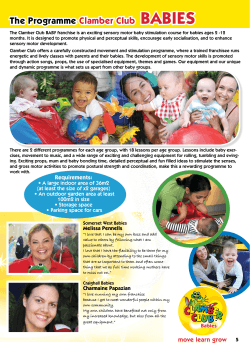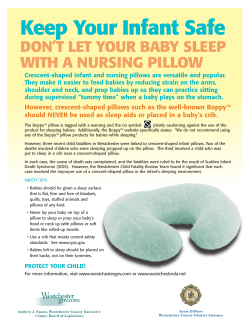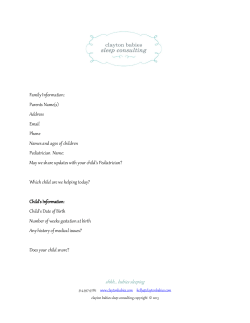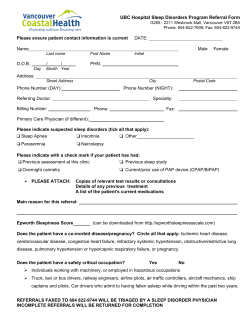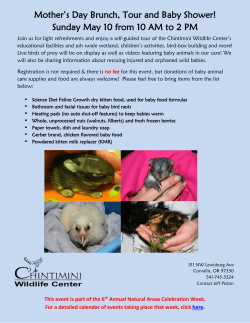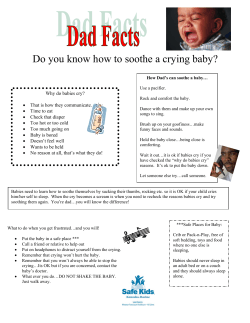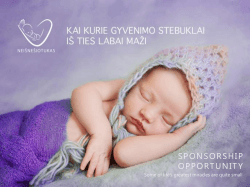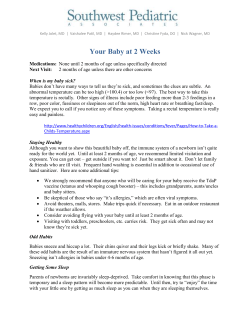
Controlled Crying Damages Your Child press
MEDIA QUERIES Laura Boon 02 9418 6247/ 0431 205 177 / laura@finch.com.au PRESS RELEASE CONTROLLED CRYING HARMS YOUR BABY Study shows babies under six months cry more when left to self-settle Infant mental health experts, Anni Gethin and them cry”, “babies can self settle’ “she will never learn Beth Macgregor, are passionate advocates for responto sleep independently if you keep helping her to go to sive parenting and gentle sleep techniques. They are sleep”’. alarmed that controlled crying in all its ‘These are all responses to the two most various guises (‘self-settling’ and ‘sleep ‘Babies subjected to predominant myths about babies and training’) is still commonly advocated by sleep,’ says Beth. extensive sleep training many parenting services and health care can exhibit the classic TWO MYTHS ABOUT BABY SLEEP workers. IMPORTANT RESEARCH FINDINGS signs of infant trauma, including intense prolonged screaming, vomiting and eventual emotional collapse. We need to call this for what it is: emotional abuse.’ ‘The research is in and the evidence is irrefutable: controlled crying is harmful to babies. It places a baby’s developing brain and emotional systems under enormous stress, and plainly contradicts neuroscience research as to what parenting a developing brain requires. Aside from the immediate distress and despair babies experience, consistently ignoring a baby’s cries also places them at risk of physical harm, losing trust in their parents, attachment problems, an impaired capacity for dealing with stress, and disrupted breast feeding. ANNI GETHIN ‘Babies subjected to extensive sleep training can exhibit the classic signs of infant trauma, including intense prolonged screaming, vomiting and eventual emotional collapse. We need to call this for what it is: emotional abuse,’ says Anni. Furthermore, despite the popularity of controlled crying in the early months or even weeks (to get baby into a ‘good routine’), younger babies are at particular risk from the harsh techniques. A review of interventions used on babies under six months, showed that behavioural interventions did not improve outcomes for babies or mothers1. In fact, the babies cried more and were at greater risk of SIDS if they also slept alone. The mothers were also more anxious, and more likely to give up breastfeeding prematurely. INACCURATE ADVICE GIVEN TO MOTHERS BETH MCGREGOR Beth says mothers still arrive at her seminars in distress, confused and feeling guilty about responding to their baby, and wondering if they should ignore their instincts and let their baby cry themselves to sleep. ‘They’re still being fed the same old rubbish. They’re told things like “babies must get settled into a routine”, “they need to learn good sleep habits as early as possible”, “you can’t hurt your baby by letting The first myth is that babies should be sleeping through the night at 6 months. Every review of actual babies sleep behaviour shows that it is common for babies to keep waking at night well into the second year. In fact, research by Australian advocates of controlled crying showed that it is common for pre-schoolers to wake in the night and need their 2 parents . Parents have been deceived into believing that babies or toddlers wake at night have a ‘sleep problem’ rather than that night waking is normal human behaviour. The second myth is that helping babies at sleep time makes them overly dependent on their parents. Decades of attachment research shows the opposite: responding consistently and warmly to babies and young children builds inner security and resilience. Ignoring distress or inconsistently responding to babies is what creates anxiety and insecurity, which can last a lifetime. IMPORTANT REALITY CHECKS FOR PARENTS AND CARERS • Night waking is NORMAL for babies.3 • Leaving babies to cry creates real distress and is consistent with long term negative impacts.4 • Conflicting advice about how to care for babies means parents suffer higher levels of anxiety than ever before. • Secure attachment and trusting their parents is the most important developmental need of babies.5 Beth concludes, ‘We want to reassure tired parents that nearly all baby sleep issues can be resolved with gentleness, patience and persistence.’ .../2 References and author profiles Anni Gethin and Beth Mcgregor are the authors of Helping Your Baby to Sleep (Finch Publishing). The fully revised and updated third edition is available 1 May in paperback ($24.99) and ebook ($9.99) nationwide. It includes a new chapter on toddler sleep. REFERENCES 1 PS Douglas, PS Hill, ‘Behavioral sleep interventions in the first six months of life do not improve outcomes for mothers or infants: a systematic review’, Journal of Developmental & Behavioral Pediatrics, 2013; 34: 497–507 2 P Lam, H Hiscock, M Wake, ‘Outcomes of Infant Sleep Problems: A Longitudinal Study of Sleep, Behavior, and Maternal Well-Being’, Pediatrics, 2003, 11(3) e203–e207 3 B Goodlin-Jones, M Burnham, E Gaylor and Thomas Anders, ‘Night waking, sleep-wake organization, and selfsoothing in the first year of life’, Journal of Developmental and Behavioral Pediatrics, 22, no. 4, 2001, pp. 226–33 4 W Middlemiss, DA Granger, et al., ‘Asynchrony of mother–infant hypothalamic-pituitary-adrenal axis activity following extinction of infant crying responses induced during the transition to sleep’, Early Human Development 88, 2012, 227–232, p. 230. ; Allan N. Schore, Affect Regulation and the Origin of the Self; The neurobiology of emotional development. Hillsdale, New Jersey, Laurence Erlbaum Associates, 1994 5 G Spangler, KE Grossmann, ‘Biobehavioral organization in securely and insecurely attached infants’, Child Dev., 1993, Oct;64(5):1439–50. ABOUT THE AUTHORS Beth Macgregor is a psychologist who provides training and mentoring to professionals who work with families and children in the health, education and welfare sectors. Her work focuses on strengthening the emotional connection between parent and child so parents can enjoy their children and children can enjoy the best possible start in life. She lives in Sydney with her husband and two beautiful children. Anni Gethin has a PhD in population health and runs a research company evaluating mental health and social programs. In 2011, she had a bonus child, Juno, a sister to her three sons. Anni lives in the Blue Mountains in NSW with her daughter and 15-year-old son; her other boys, when in Australia, drop by regularly to raid the fridge. MEDIA QUERIES For reviews, extract rights and to set up an interview, contact: Laura Boon Ph: 02 9418 6247/ 0431 205 177 E:laura@finch.com.au
© Copyright 2025
